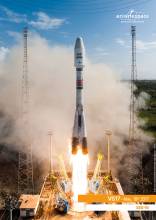A newly launched project, BUILDSPACE, funded under the European Union’s Horizon research framework program will merge thermal data from drones and ground-based monitoring systems to improve energy-efficiency in city environments.
Reinhard Blasi, market downstream and innovation manager at the European Union’s Agency for the Space Program (EUSPA), told Inside GNSS, “You will already know that there’s a lot of effort in new technologies that save CO2. But we can also look at infrastructure that we already have in place, where there can be a lot of leakage due to bad insulation and such.”
BUILDSPACE is a cooperative research initiative being coordinated by the National Technical University of Athens and including the Chancellor Masters and Scholars of the University of Cambridge. Researchers will bring together terrestrial data from buildings, collected by internet-of-things (IoT) platforms and building information modelling (BIM) solutions, along with aerial imaging from drones equipped with thermal cameras and location-annotated data from space systems, i.e., GNSS and Earth observation satellites. The aim is to deliver new services for building and infrastructure managers and other urban stakeholders, to support informed decision making towards energy-efficient and climate-resilient cities.
A clear picture of energy efficiency
The BUILDSPACE platform will allow users to generate high-fidelity digital twins, at city-wide scale, providing heat and flood analysis, helping city authorities identify environmental hotspots that can increase pressure on local urban ecosystems. It will provide decision support services for energy demand prediction, and will be able to provide alerts and recommendations for action. The new platform and all user services will be tested in a number of European cities with different climate profiles. Digital twins will be developed in Piraeus, Riga and Ljubljana and further testing will be carried out during the construction of a new building in Poland.
The most recent call for research proposals administered by EUSPA, under the EU’s Horizon research framework, included a special topic in support of the Union’s ‘Green Deal’. Blasi said, “We now have a number of projects that are about to kick off or have just have kicked off. Some of the new projects are strictly GNSS, while others include more focus on earth observation. All of them have a green component. This one, BUILDSPACE, is a great example, including work with GNSS-enabled drones for detecting situations where intervention would prevent loss of energy, as an easiest way basically to contribute to a greener environment.”






